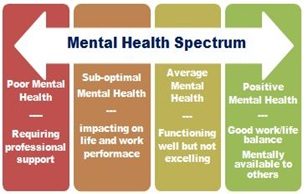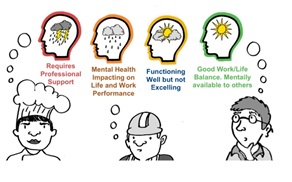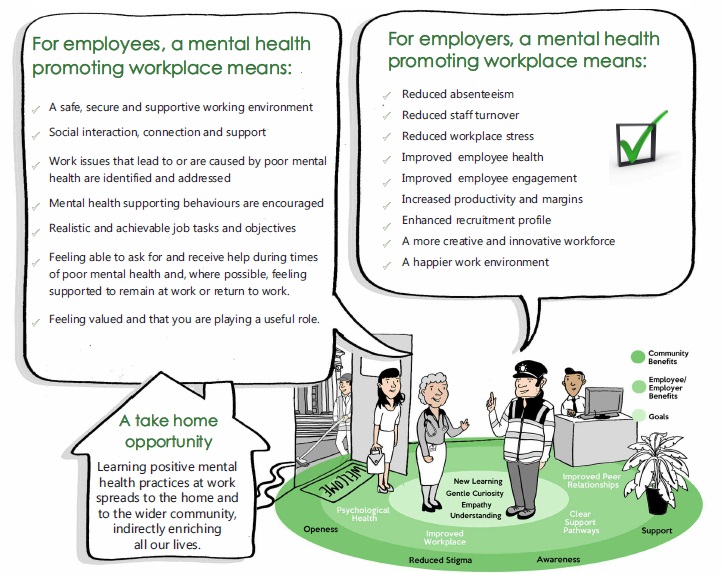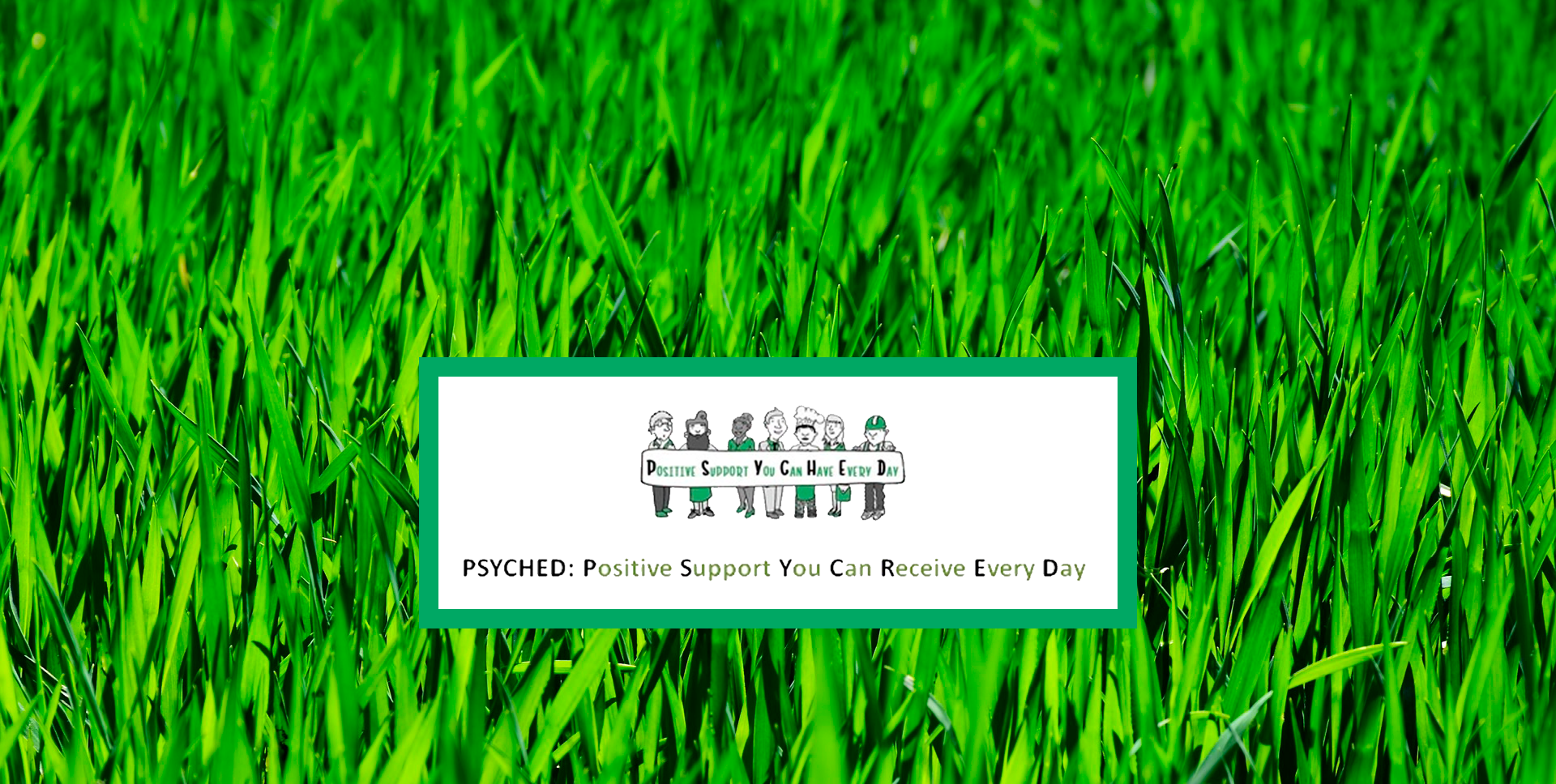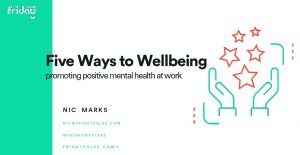
Click here to access NIC MARCS 5-WAYS TO WELLBEING presentation slide
Click here to access PSYCHED WEBINAR 5 Ways to a Happy Culture on YOUTUBE
Check out our YouTube channel and videos to learn more
about Psyched and getting involved!
————————————————————————————————————————————————————————————————————————————–
What is Psyched?
PSYCHED is an initiative of Healthy Cities and Counties, supported by the Health Service Executive, University College Cork, Cork City Council, Cork County Council and community workplace partners. We want workplaces to get PSYCHED about mental health and wellbeing!
PSYCHED aims:
1. To stimulate conversations in the workplace leading to a better understanding of mental health
2. To encourage employers to engage with staff
to promote and foster mental health in the workplace by setting goals for positive improvement
3. To celebrate commitment, good practice and innovation in mental health promotion in the workplace through participation in the 2019 PSYCHED awards.
Our goal:
To promote better mental health in workplaces, in order to grow understanding and reduce stigma towards mental illness in our wider community.
See our You Tube video ABOUT PSYCHED
Why get Psyched?
Just like our physical health, our mental health can vary from day to day. Learning about mental health in the workplace helps to develop working environments that are supportive, nurturing and open to growth and change.
We invite workplaces to get PSYCHED. Whatever your activities, no matter how big or small, join in to share good practice, ideas and workplace initiatives that support mental wellbeing.
Downloadable Resources
Past Events
Hugh O’Donovan – Mindful Walking: Walk your way to physical and emotional wellbeing
Aoife McElwain – Slow at Work: How to work less, achieve more and regain your balance in an always on world
How do I get Involved?
1. Look at the information on this site about ways to get PSYCHED at work. Small things make a big difference. Decide to become PSYCHED about your workplace!
2. Get inspiration from workplaces that have participated in PSYCHED here and check out the PSYCHED survey Psyched survey infographic
3. Download our 5 Steps to Workplace Mental Health Promotion
4. Talk to colleagues to start the conversation about what a PSYCHED, mental health promoting workplace means to you. Discuss what your workplace might like to do and send examples of initiatives you are running in your workplace to share your good ideas and experience with other businesses.
5. Join the PSYCHED community to share ideas, collaborate at workshops, attend events, submit your PSYCHED activity and participate in the annual PSYCHED celebration.
Understanding mental health
Mental health exists on a continuum ranging from poor mental health to positive mental health. Mental health is comprised of emotional, psychological, and social wellbeing (Keyes, 2002).
g
FAST FACTS
What is Mental Health?
• Mental health describes how we think and feel about ourselves and others and how we interpret events in everyday life. It also relates to our ability to cope with change, transition, significant life events and the stress that often comes our way.
• Mental health refers to the emotional resilience to be able to enjoy life and to survive pain, disappointment and sadness, and to the level of belief in your own and others’ dignity and worth.
• Most experts consider mental health as a continuum. Thus, the quality of an individual’s mental health may have many different possible levels.
• (An understanding of) mental health…includes the awareness that mental health is broader than an absence of mental disorders; that poor mental health affects our ability to cope with and manage our lives, particularly during personal change and through key life events, and decreases our ability to participate fully in life; and that mental health is an essential component of general health, which it underpins (A Vision for Change, 2006). A Note on Key Terms iii
• Mental health and mental well-being are therefore part of everyday life, in that mental well-being is influenced, both positively and negatively, in every area of life; in families, schools, the workplace and in social interactions. (A Vision for Change, 2006).
(Source: Mental Health in Ireland: Awareness and Attitudes (HSE, 2017)
——————————————————————————————————————————————————————————————————————————–
The Benefits of a mental health
promoting workplace
Work takes up a third of our day. It has an important role in our lives. The working environment can positively or negatively affect our mental wellbeing and, in the same way, we can positively or negatively affect our workplace.
g
g
g
PLUS – Creating a workplace culture, that is open to learning and shows understanding of mental health has benefits for employers, employees and the wider community. (Pic below)
———————————————————————————————————————————————————————————————————————————–
What does a PSYCHED
workplace look like?
-
- All staff are treated with dignity and respect.
-
- Staff are clear about what they have to do, how they do it and why they are doing it.
-
- Mental well being is actively promoted and is a topic of conversation.
-
- Anyone experiencing a period of low mental health feels supported by colleagues and management.
- Management and employees know how to ask for and to offer help and are supported by structures and a work culture that facilitates this.
g
g
g
-
- Efforts are made to ensure effective communication between management and staff and among staff members.
-
- Opportunities for new learning and further development are available and encouraged.
-
- Interaction with work colleagues and social connection is part of the working day
- Is eligible to be awarded a PSYCHED certification for mental health promotion in the workplace.
Context: A time for change.
The Department of Health and Children published Healthy Ireland: A Framework for Improved Health and Wellbeing 2013-2025 in 2013 and Connecting for Life: Ireland’s National Strategy to Reduce Suicide 2015-2020 in 2015 . Both policies aim to improve health and wellbeing outcomes at both a general population level and specific target group levels.
Within the framework of these policies there is considerable scope for a universal intervention programme aimed at promoting mental wellbeing and developing resilience.
Health, both mental and physical, impacts greatly on overall wellbeing, particularly in light of the socioeconomic consequences of poor health. Not only is the individual’s immediate support network impacted by poor health, “adverse trends in the health of the community and the population impact on the whole of society.” (Department of Health and Children, 2013, p. 6)
Many people have misconceptions about mental health problems. (WHO, 2005, p. 13)
Examples of misconceptions include:
• The belief that mental health problems cannot be treated.
• The belief that personal deficiencies can lead to mental health problems.
• The belief that people diagnosed with mental health disorders are unable to run their own lives or make decisions pertaining to their lives (WHO, 2005).
The improving levels of employment in Ireland provide considerable scope for the delivery of a universal intervention programme aimed at promoting mental wellbeing via the workplace, particularly considering that “the failure to prevent, recognise and treat mental health problems in the workplace has an impact on employers, employees and their families, and the community generally.”
The relationship between work and mental health.
The World Health Organisation (WHO) states that work “substantially contributes to a person’s identity; it provides income for an individual and his or her family, and can make a person feel he or she is playing a useful role in society. It is also an important source of social support.”
(WHO, 2005, p. 9)
Furthermore, the workplace itself can have either positive and/or negative effects on an individual’s mental wellbeing.
The National Institute for Health and Care Excellence (NICE) recognises that work is “an important determinant of self-esteem and identity [providing] a sense of fulfilment and opportunities for social interaction.”
(2009, p. 6)
However, difficult working environments can adversely affect an employee’s mental health, particularly when they are exposed to stress. The workplace can be positively or negatively impacted by the wellbeing, mental health and resilience of an employee. The Workplace Health and Well-Being Strategy: Report of Expert Group (2005) reports that mental health issues, particularly stress, are the second highest cause of work-related health issues within the EU.
Within an Irish context, the main mental health issues that impact on the workplace in terms of absenteeism are anxiety and depression (13%), stress (7%), nervous debility and/or bereavement (4%) and post natal depression (2%). Absence costs small business over €490 million per annum with 4,052,222 days lost in 2014 (SFA, 2016)
Bevan, McGee, and Quadrello (2009) state that up to 20% of all working days lost in Ireland each year are due to stress related illness. Furthermore, the Work Positive Project 2005-2007 cites figures from the Department of Social and Family Affairs indicating that stress was the cause of 1.7% of all occupational injury benefit claims allowed in the Republic of Ireland in 2006.
Mental Health in
the Workplace
• The main mental health issues that impact on the workplace in terms of absenteeism are anxiety and depression (13%), stress (7%), nervous debility / bereavement (4%) and post natal depression (2%). Absence costs small business over €490 million per annum with 4,052,222 days lost in 2014 (SFA, 2016)
• The main workplace issues that can create/ lead to poor mental health include: role ambiguity, role conflict, role overload, work-family conflict , performance monitoring, job design, monotony and repetition and job opportunities. (Mellor et al, 2014)
• Almost half of Irish workers indicate that their time in work consists mainly of tasks that involve physical activity – moderate physical effort (35%), physically demanding work (13%).
g
g
g
• The most prevalent workplace induced condition affecting mental health is burnout. Burnout is defined as “a stress reaction to prolonged exposure to job stressors.” ( Maslach et al, 2000) Burnout symptoms:
¬ emotional exhaustion,which refers to work-related fatigue;
¬ depersonalization that results from an indifference to work; and
¬ diminished feelings of accomplishment, which accounts for a decline in one’s competence and productivity.”
(Schaufeli, et al, 1996)
• Males and females can exhibit different burnout behaviours with females more inclined to exhibit emotional exhaustion than males and males more likely to exhibit depersonalisation than females. (Purvanova et al, 2010)
g
g
g
• Roughly a third of Irish workers (34%) spend most of their time sitting. Those aged 35 to 44 are most likely to indicate that the time spent working is mainly spent sitting down (41%) and are least likely to be in jobs that are classified as being physically active (41%). Almost three-quarters (74%) of 35 to 44 year olds indicate that they are currently in work – higher than for any other age group. The extent of long time periods spent sitting in work is a particular challenge for this age group. Addressing this challenge will need to include ways to incorporate physical activity into the working day, including active travel and other workplace-based initiatives.
• A supportive work environment, Employee Assistance Programmes, workplace courses on stress management, resilience training and skills training are all factors that can alleviate and prevent workplace stress. (Mellor, 2014)
Mercer Survey
Methodology:
The survey was conducted by Red C among a representative sample of 1,500 employees in the UK and Republic of Ireland between 27th May and the 4th June
Key concerns: Maintaining health – 59%; providing for their family if impacted by illness or death (55%); Paying bills – 54%; Retirement saving – 51%
Impact of key concerns: Reduced concentration – 64%; Reduced job satisfaction – 59%; Lower Productivity – 44%
Improved satisfaction with employer: Help with stress – 61%; Financial and retirement planning advice – 58%; Online training – 58%; Healthy lifestyle support – 48%
g
g
Mental Health in Ireland
• In Ireland, one in four people will use a mental health service at some stage of their lives
• 9% of population indicate a probable mental health problem. 11% of people said they had personally experienced a mental health problem.
• 85% of people agree that “anyone can experience a mental health problem”.
• 62% would not want others knowing if they themselves had a mental health problem.
• 52% expressed that people with mental health problems should not be allowed to do important jobs such as doctors, nurses, etc.
• Men reported higher positive mental health scores than women (69.8 and 65.9 respectively)
• Similarly, higher positive mental health was reported among younger people than older people
(15-24: 69.1; 75 and older: 61.6)
• Those living in Dublin report lower scores on the Mental Health Index-5 (MHI-5) scale than those living elsewhere (79.8 and 85.2 respectively). This suggests higher levels of psychological distress in Dublin
g
g
• Male respondents were more likely to list problems at work and not having a good job as concerns; female respondents, particularly those under 35, were more likely to list the fear of ‘not being loved’ and interpersonal / working relationship stress as concerns.
• Talking is regarded as the most effective means of looking after your own mental health – to friends, to family members, to people who have had similar experiences and to counsellors or psychotherapists.
• The vast majority of adults would turn to their GP as their first point of professional contact if they thought they had a mental health problem.
• 86% of Irish adults rate their own quality of life as good or very good, but this falls to 64% among those who have personal experience of mental health problems.
• For people who experienced mental health problems, reported quality of life is significantly better if the person has good levels of social contact.
• Approximately half (52%) have had some experience of people with mental health problems
Small changes can
make a big difference
Every workplace is different but the common denominator between all workplaces is people. Having a plan and a structure to support mental wellbeing is important to achieve a balance between productivity and a positive healthy workplace. Small changes can make a big difference. It’s not the size of the organisation it is the little things we do that have the biggest impact.
There are many ways to promote mental health in your workplace. Click [here] to find some more simple ideas to get you thinking
Some ideas to create a mental
health promoting workplace
• Identify workplace wellness champions or motivators to encourage and coordinate well being initiatives in the workplace.
• Developing a wellbeing Policy or statement under dignity at work (Having a plan)
• Developing a well being charter on the culture of the organisation that mental health and wellbeing are just as important as physical health.
• Create a staff wellness hub, either a notice board or on your staff website, providing information on minding your mental health e.g. stress management, physical activity, mindfulness and relaxation techniques.
g
g
g
• All work mobile phones having the 24/7 Support lines as a matter of course therefore everybody has access to them.• Displaying support numbers within your organisation
• Having fun days for people to get to know each other
• Developing a buddy system to support each other
• Having wellness workshops to cover Nutrition, Sleep, Exercise, yoga and other mindfulness
• Get involved in local initiatives (or develop your workplace one) such as fun runs, charity events, choirs; etc. to promote connection and social interaction with others.
• Arrange group walks, fun runs, yoga classes, during or after work to build more opportunities for group physical activity to promote well being.
• Utilise ‘walking meetings’ or planning sessions, etc to increase opportunities for physical activity within the working day.
• Create a list of workplace and local services and supports which may be useful to staff at different times in their lives, e.g. counselling services, bereavement services, financial guidance. Ensure all staff can access it freely.
 Watch youtube clip from Michael Noonan who spoke about his lived experience at the PSYCHED event on the 8th May 2019 County Hall Cork
Watch youtube clip from Michael Noonan who spoke about his lived experience at the PSYCHED event on the 8th May 2019 County Hall Cork




